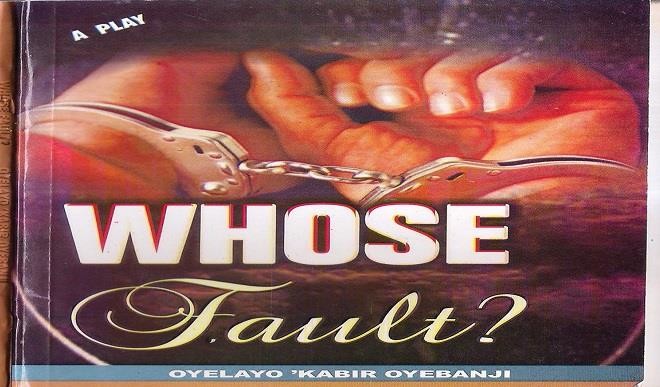Short reviews of Oyebanji’s book
Every book is a product of an author. So, to understand books we first need to know the personality and influences on the author. I have known Oyelayo Kabir Oyebanji for over two years. He is an interesting person to be with and he has many ideas that he wants to share. I believe these […]


Every book is a product of an author. So, to understand books we first need to know the personality and influences on the author. I have known Oyelayo Kabir Oyebanji for over two years. He is an interesting person to be with and he has many ideas that he wants to share. I believe these four books have given him an avenue to share his ideas and I hope we will listen to him in these books namely: Whose Fault?; Witch, Wizard or Drug?; The Pathway; Drugs and The Youths: Challenges of Sustainable National Development. This review is done by highlighting the main ideas of these books one after the other while given an appraisal.
Whose Fault? (A play)
The 113 pages of this book mirror some of the happenings in higher institutions of this country. Here sexual immorality leads to other corruption like cultism, violence and killings. The title is apt because it keeps readers in suspense. Although the question is put in the mouth of Mrs. Akoran who should not be asking whose fault, this leaves a critical reader with the belief that there could be other reasons for the behaviour of Prof. Akoran in the play.
The author in the epilogue categorically states that the book is a work of fiction but for readers in Nigerian higher institutions of learning, the incidences are real, the characters are factual and the scenes of the play are very familiar. This is a must read book for all stakeholders in education, administrators, governments, students, and community members.
While appreciating the rigors of this work, there is need for some minor editing of the book. This of course does not rid it of the masterpiece which it is.
Witch, Wizard or Drug? (short stories)
This is an 18-page book consisting of series one, two and three with headings of misconception, inferiority complex and perception respectively. I think what the victims and casual readers would term as responsible for the tragedies of the characters in this stories is what the author has rightly provided in the heading.
While the offenders in the 2nd and 3rd stories suffered for their misdeeds, the victim in the first story suffered from the behaviour of his mother (Africans Belief – Misconception). The morality in these stories is that we should not think what we have in terms of material blessings came from our efforts alone. In the other stories, we are taught to accept our personality and not try to be what we are not because we want to impress others.
I recommend these stories for everyone who is trying to find meaning in life. I think all of us need to read this book because we are never fully satisfied with ourselves, the way we are created by the Supreme Being.
Dr. Omoregie is of the Dept. of Adult Education, University of Ibadan
